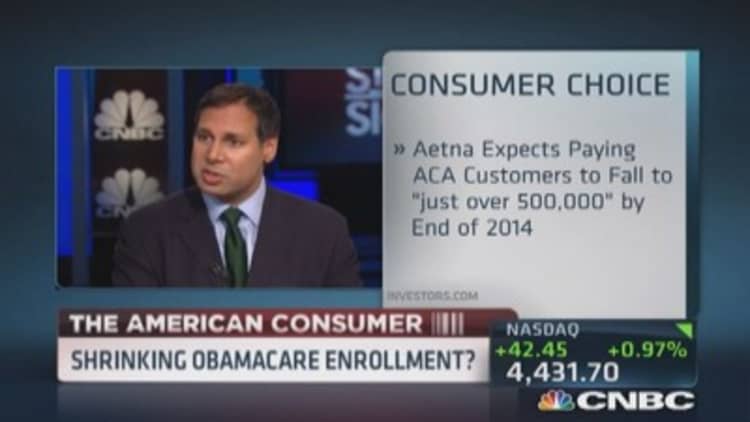Many businesses said Obamacare is jacking up their employee health coverage costs, and they expect it to do so even more next year, two new surveys of businesses by the Federal Reserve Bank of New York have found.
As a result, consumers in the areas covered by the bank could be paying more next year—and some workers at the firms might need to look for a new job, the surveys found.
The median respondent to the N.Y. Fed surveys expects health coverage costs to jump by 10 percent next year, after seeing a similar percentage increase last year.
Not all firms surveyed said the Affordable Care Act (ACA) is to blame for those cost increases to date. But a majority did, and the percentage of businesses that predicted the ACA will hike such costs next year is even higher than those that said it did this year.
More than a quarter of the manufacturing and service firms surveyed said they either have or will boost prices for goods and services "because of the effects that the ACA is having on your business," according to the bank's surveys.
About 20 percent of respondents to both surveys said they were reducing their number of workers and/or raising the share of part-time workers as a result of the ACA.
"A similar proportion said they were paying less compensation per worker because of the ACA, and a similar proportion said they were outsourcing more work," according to the bank's report.
Read More'Delete' this Obamacare email
However, the report noted, more than half of the service firms and almost half of the manufacturers said they were not making any changes to their workforce levels, compensation levels or prices in response to those increased health coverage costs.
A Centers for Medicare and Medicaid Services official was not immediately available for comment.
The report is based on two surveys by the bank, whose jurisdiction includes New York state, New Jersey's 12 northern counties, Fairfield County in Connecticut, Puerto Rico and the U.S. Virgin Islands.
The monthly Business Leaders Survey of the same 150 or so service sector executives in that area usually garners about 100 responses each month, while the monthly Empire State Manufacturing Survey of about 200 top executives in New York state also leads to about 100 responses.
Almost all of the firms that responded—about 95 percent—already offer health coverage to their employees, even though the ACA mandates that they do so or pay a penalty doesn't start kicking in until 2015.

"One clear finding of this survey [and of a somewhat similar survey we did last July] was that the ACA was widely seen as raising health coverage costs for businesses," wrote Jason Bram and Michael Kubiske, two researchers at the Federal Reserve Bank of N.Y.
Read MoreWatch out retailers: Wal-Mart health care hit
This year, for example, 73 percent of the manufacturers said Obamacare has increased health costs either "a little" or "a lot" in 2014, while 58 percent of service firms gave the same answers when asked about that effect.
But more than 24 percent of manufacturers said the ACA had "no effect" on those costs and 35 percent of service firms also said there was no effect on their health costs from Obamacare.
However, just 16.3 percent of manufacturers said they don't think the ACA will have any effect on their employee coverage costs in 2015. Only 23 percent of service firm executives said it would have no effect next year.
More than half of the manufacturers who responded said they expect Obamacare to drive up their health coverage costs "a lot" in 2015.
Read MoreNew twists ahead for your employer's health plan
A third of service firms expect Obamacare to "increase costs a lot" next year.
More than half of all the firms are modifying their health plans in response to Obamacare.
Of those firms, the large majority are doing so by having workers bear a greater share of the costs of their coverage, either in the form of higher premiums, deductibles or copayments, or some combination thereof.
The full survey results can be read here.
—By CNBC's Dan Mangan


